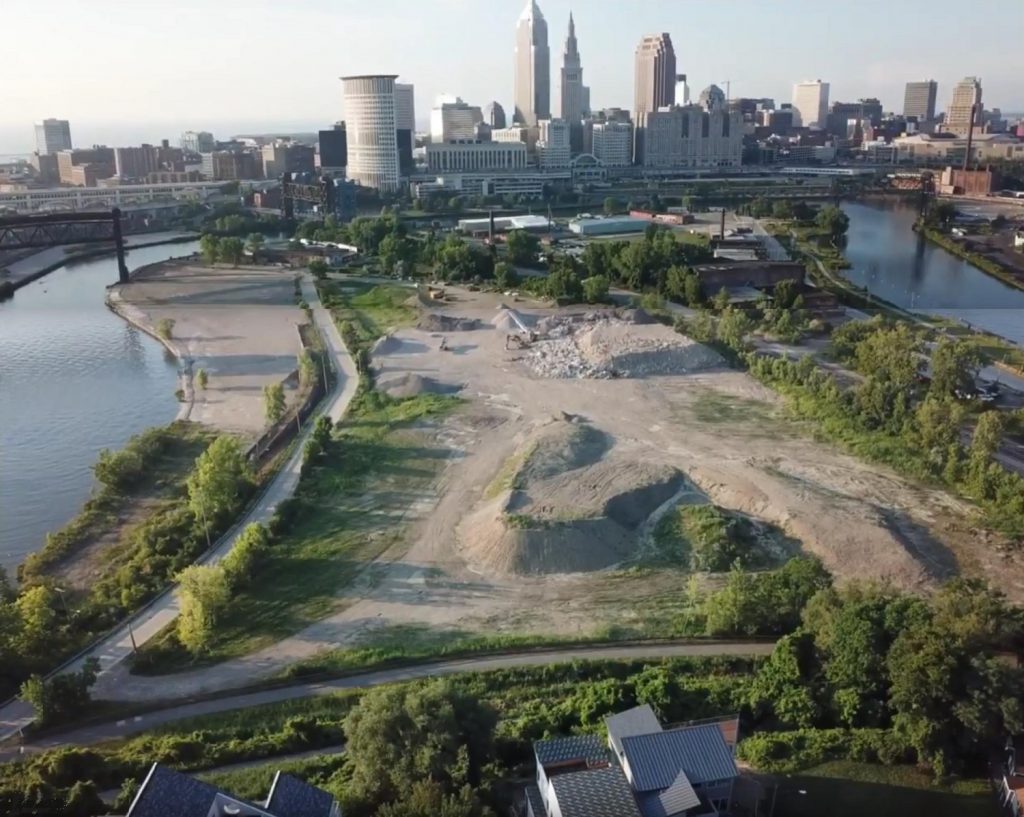
Looking north across Scranton Peninsula toward downtown Cleveland, Great Lakes Brewing Co.’s proposed production facility would rise on leveled land in the foreground. At the far left, a property acquired this past summer by the brewery would also be cleared and graded, but for a brewpub/tasting room. Leveling and removing trees from the perimeter of the two properties is the subject of a permit application submitted yesterday to the City of Cleveland’s Building & Housing Department. (Aerial Agents). CLICK IMAGES TO ENLARGE THEM
Application to city suggests buildings may rise in 2022
Great Lakes Brewing Co. (GLBC) has asked the city of Cleveland for permission to begin site preparation work prior to the expansion of brewing facilities on to Scranton Peninsula near downtown. A permit application submitted yesterday doesn’t reveal when the actual expansion work would begin, saying instead that the work would prepare for “future use” of the Flats site. However, the permit request hints structural construction for the expansion could begin in about six months.
Also, the future use is not specified in the application submitted by a civil engineering firm to the city of Cleveland’s Building & Housing Department. Yet GLBC representatives have said the company intends to construct a production facility as well as a riverfront brewpub/tasting room on Scranton Peninsula. Those plans have been brewing for several years but have yet to be reviewed by City Planning Commission.
For the production facility, the regional brewery under the name Carter Inland LLC bought 8 acres of land in 2018 at the interior of Scranton Peninsula. The site is next to the Cleveland Foundation Centennial Lake Link Trail. And in June 2021, GLBC under the name Carter Riverfront LLC acquired 1.873 acres of land across Carter Road from the future production facility site for a brewpub/tasting room next to the Cuyahoga River.
Mike McNerney, project contact for GLBC, did not return an e-mail seeking more information late yesterday. Fred Geis, a partner in the Thunderbird development partnership which sold the land to GLBC, did not return a message prior to publication of this article. Nor did Ward 3 City Councilman Kerry McCormack.
While no structural construction is indicated in the permit application, there is a significant amount of work proposed. Included is the clearing of brush and trees on a site measuring 396,400 square feet, or 9.1 acres. Most of the clearing work would be around the perimeter of the property near Carter, the trail and the Flats Industrial Railroad where most of the vegetation is concentrated.
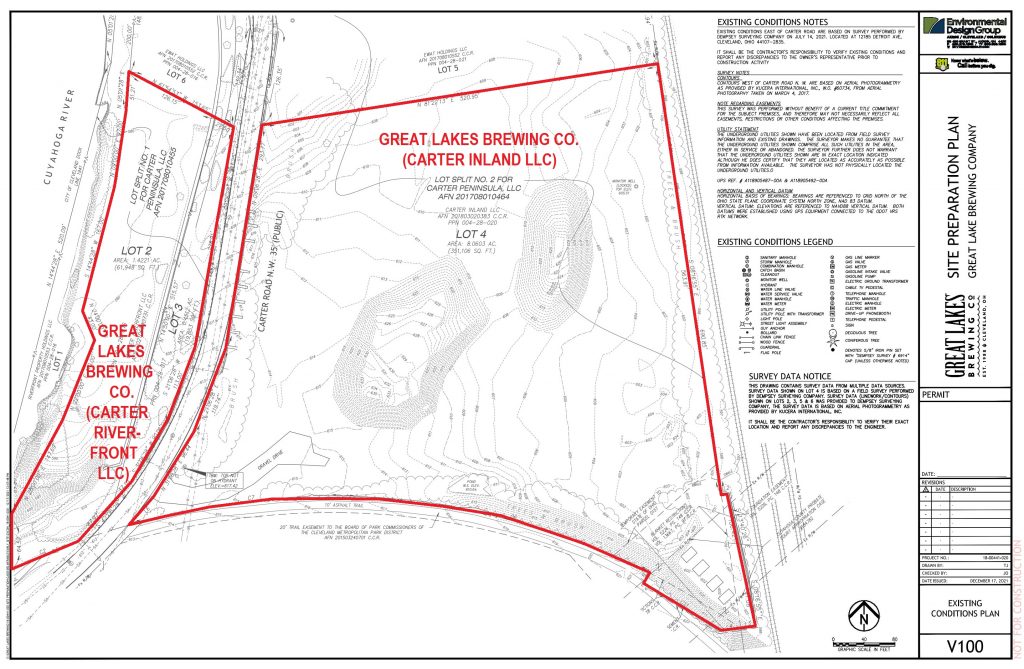
This site preparation plan was included in the permit application submitted yesterday on behalf of the Great Lakes Brewing Co. It shows the existing, uneven elevations of their two separate sites. The larger, 8-acre property owned by the brewer’s affiliate Carter Inland LLC is proposed to be used by a new production facility. The smaller, 1.9-acre site along the Cuyahoga River is owned by GLBC’s Carter Riverfront LLC subsidiary. The red line and labels were added by NEOtrans for clarity (EDG/B&H).
Nearly all of the land is to be graded and leveled, flattening two large mounds of earthen material that are piled 15-20 feet higher than the surrounding land. Much of the 8 acres of the Carter Inland property is to be raised 1-3 feet. Similarly, the nearly 2-acre Carter Riverfront property is to be raised about 3 feet, plans show. After the earthmoving, the land is to be subjected to a dormant seeding or mulch cover if no further construction is to be done within 14 days, according to the application.
However, the application specifies that a Storm Water Pollution Prevention (SWPP) permit is required and that its duration for the grading work would be for six months. An SWPP permit involves keeping dirt, rocks and other debris from leaving a construction site and getting into the gutters and storm drain system. Cost of the work described in the application is estimated at $650,000. Environmental Design Group of Akron submitted the permit application on GLBC’s behalf.
“Something is causing them to have to disturb the earth enough to re-seed,” said a construction industry executive who did not wish to be identified publicly. “Otherwise, if it’s not disturbed they typically wouldn’t be obligated to seed for no reason. Seeding doesn’t always mean it will sit for a while, but I find it unusual given the time of year.”
He noted that, when he has had a large site with a building and the site is graded in the fall, but the building won’t be finished until the following year, his firm will seed in late fall to get some growth and minimize erosion before the final site work occurs prior to opening.
GLBC’s site prep application addresses this issue. It reads “Any disturbed area that is not going to be worked for 14 days or more must be seeded and mulched by Nov. 1 or must have a dormant seeding or mulch cover applied between Nov. 1 and March 1.”
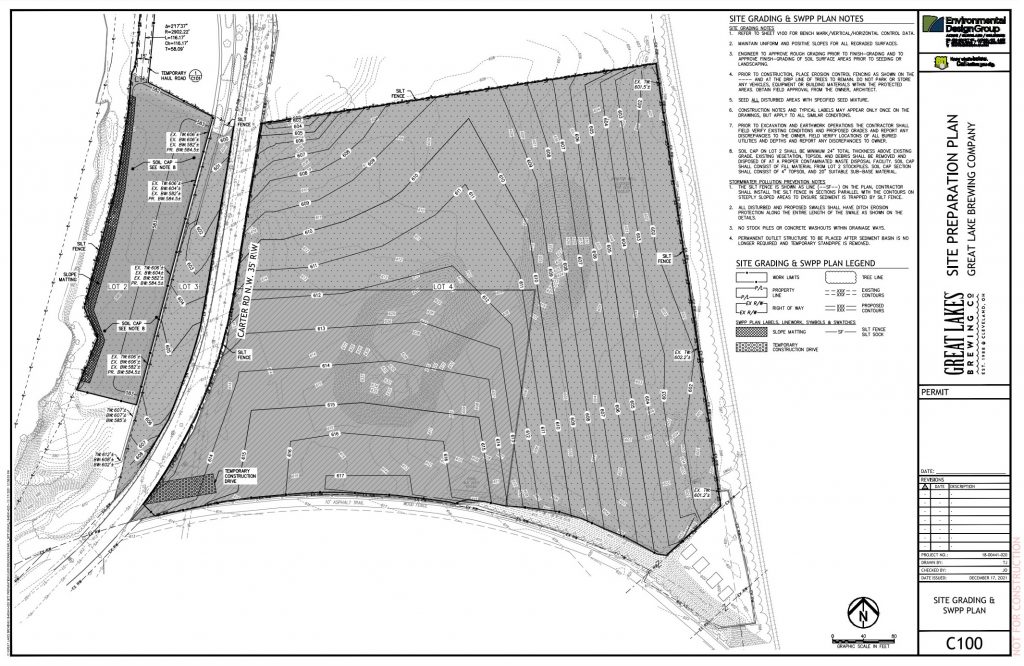
Compared to the prior image, the significance of the grading work is evident in this image from Great Lakes Brewing Co.’s site preparation permit application. The large and abrupt mounds of earthen material and other uneven ground would be leveled to gradually climb south towards the Cleveland Foundation Centennial Lake Link trail. The trail is at the bottom of the hill below the Duck Island neighborhood (EDG/B&H).
Interestingly, some insight into GLBC’s intentions came from people seeking to develop a neighboring property. Silver Hills Principal and Founder Seth Mendelsohn wants to build 300 apartments on 4 acres of riverfront land just north of GLBC’s Carter Riverfront property. At a Dec. 3 City Planning Commission meeting, he said he has had conversations with GLBC staff about their plans.
On its newly acquired riverfront parcel, GLBC reportedly is looking at developing a brewpub/tasting room that’s a little smaller than BrewDog Cleveland’s recently opened brewpub at the north end of Scranton Peninsula. Mendelsohn also said GLBC is considering hosting food trucks but the concept is still preliminary and no plans have been publicly released. Silver Hills at Thunderbird’s site plan includes a pedestrian walkway and easement between its two apartment buildings for people walking to/from GLBC’s properties and the riverfront, Mendelsohn said.
Thunderbird is a consortium of developers comprised of Fred Geis, J Roc Development and investors like Savannah, GA-based Matt Weiner organized as East West Alliance. In 2017, Thunderbird acquired 25 acres of Scranton Peninsula land, created a development vision for it, divvied it up into saleable pieces and began to market them. A publicly accessible riverfront boardwalk is planned along the west side of Scranton Peninsula by a Thunderbird affiliate Riverfront Property Holdings LLC.
“We’re especially excited about the breweries that are going in and the parks that are going in,” Mendelsohn said.

This is a site plan for the neighboring Silverhills at Thunderbird residential development, with north at right and Carter Road along the bottom. At the left is a proposed brewpub/tasting room on land purchased last summer by Great Lakes Brewing Co. The label for that building’s outline reads “Proposed building by others; shown for context only” (Dimit).
GLBC’s permit application shows it wants to construct an earthen fill for a construction road around the north side of a concrete retaining wall left over from Republic Steel’s Upson Nut Division plant that stood on the western half of Scranton Peninsula for a century until the 1980s. The roadway would allow vehicles to deliver fill dirt to the Carter Riverfront property so its surface can be elevated. Construction and use of the roadway requires access to and use of a property that Silver Hills has an option to purchase.
A year ago, Great Lakes launched a new canning line and warehouse facility in suburban Strongsville. The 67,000-square-foot facility includes cold storage and nine truck bays. The canning line allows the brewery to package as many as 310 cans per minute. Great Lakes transports beer brewed at its production brewery in Cleveland’s Ohio City neighborhood to be packaged just 20 miles away at the Strongsville facility via a fleet of two 200 barrel tanker trunks.
But the Ohio City production facility is reportedly cramped and in need of expansion. That can’t be done easily in densely developed Ohio City. Instead, Great Lakes representatives have said that they would like to expand their production facilities on Scranton Peninsula, which was their motivation for buying the 8-acre Carter Inland property three years ago.
“We’ve known for a long time that the future is in cans — that’s where the growth is, so that’s where we need to be,” said Great Lakes CEO Mark King in a written statement. “We’re hyper-focused on offering the right brands in the right packages. We’ve dipped our toe in the water with a few canned brands in 2020 to fantastic results, and we’re confident that our new facility will set us up for even more success.”
Tyler Kapusta contributed to this article.
END



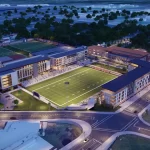



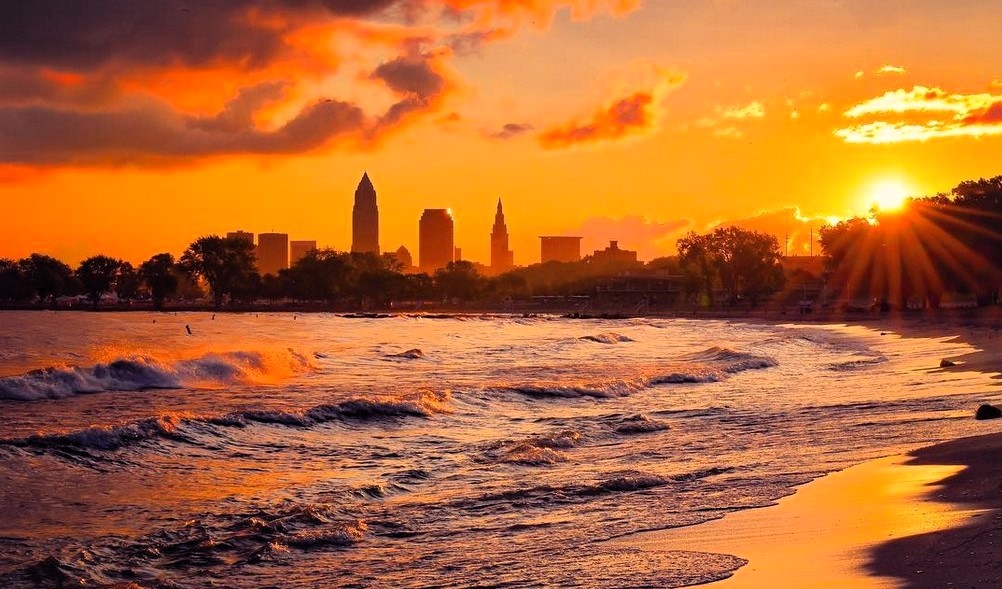
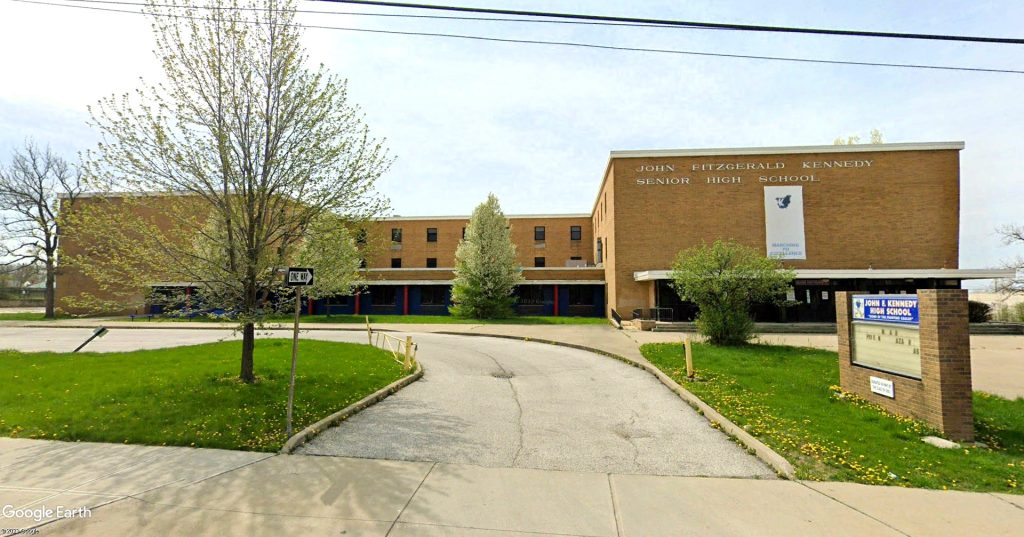

Comments are closed.